中考英语语法知识点解析
- 格式:doc
- 大小:225.00 KB
- 文档页数:33
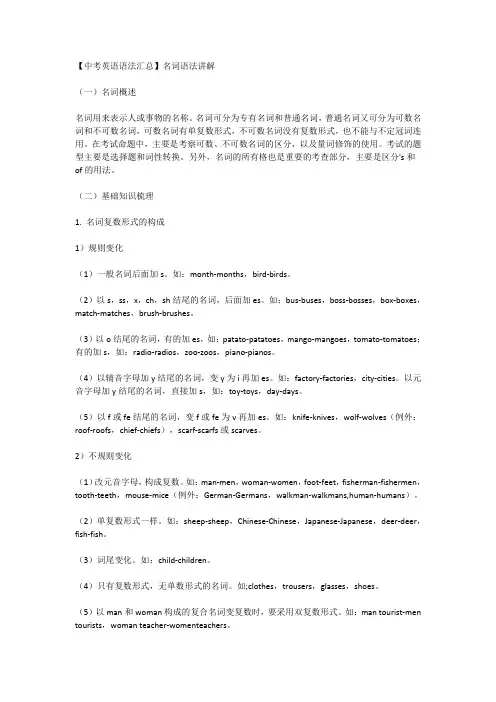
【中考英语语法汇总】名词语法讲解(一)名词概述名词用来表示人或事物的名称。
名词可分为专有名词和普通名词,普通名词又可分为可数名词和不可数名词,可数名词有单复数形式,不可数名词没有复数形式,也不能与不定冠词连用。
在考试命题中,主要是考察可数、不可数名词的区分,以及量词修饰的使用。
考试的题型主要是选择题和词性转换。
另外,名词的所有格也是重要的考查部分,主要是区分's和of的用法。
(二)基础知识梳理1. 名词复数形式的构成1)规则变化(1)一般名词后面加s。
如:month-months,bird-birds。
(2)以s,ss,x,ch,sh结尾的名词,后面加es。
如:bus-buses,boss-bosses,box-boxes,match-matches,brush-brushes。
(3)以o结尾的名词,有的加es,如:patato-patatoes,mango-mangoes,tomato-tomatoes;有的加s,如:radio-radios,zoo-zoos,piano-pianos。
(4)以辅音字母加y结尾的名词,变y为i再加es。
如:factory-factories,city-cities。
以元音字母加y结尾的名词,直接加s,如:toy-toys,day-days。
(5)以f或fe结尾的名词,变f或fe为v再加es。
如:knife-knives,wolf-wolves(例外:roof-roofs,chief-chiefs),scarf-scarfs或scarves。
2)不规则变化(1)改元音字母,构成复数。
如:man-men,woman-women,foot-feet,fisherman-fishermen,tooth-teeth,mouse-mice(例外:German-Germans,walkman-walkmans,human-humans)。
(2)单复数形式一样。
如:sheep-sheep,Chinese-Chinese,Japanese-Japanese,deer-deer,fish-fish。

史上最全的中考英语语法必考知识点大全
一、时态
1.一般现在时:叙述现在地基本情况及习惯性动作,主动形式表示现在状态或现在客观存在的事实。
2.一般过去时:表示过去其中一时间发生的动作和存在的状态。
3.现在完成时:表示从过去其中一时间开始,一直延续到现在的动作或状态。
4.现在进行时:表示此刻正在发生的动作或存在的状态。
5.一般将来时:表示将来其中一时刻或其中一段时间内发生的动作或存在的状态。
6.过去将来时:表示过去时预计或计划将来要发生的动作或存在的状态。
7.状语从句中的时态:
(1)主句是一般现在时,从句一般用一般现在时;
(2)主句是一般过去时,从句一般用一般过去时;
(3)主句是一般将来时,从句一般用一般将来时;
(4)主句是现在完成时,从句一般用过去将来时。
二、句法结构
1.主谓一致:谓语动词表达的动作所发生的时间和主语之间是一致的关系。
2.主语从句:即用疑问词引导的从句,其主语在句中充当整个句子或者句子成分的主语。
3.主谓宾:即主语、谓语动词和宾语三部分的句子结构。
4.定语从句:即用关联词引导的附加句,其作用是对主句中的一些名词或代词进行补充说明。
5.宾语从句:即用从属连词引导的从句,其作用是把从句的内容作为宾语放在动词后面。
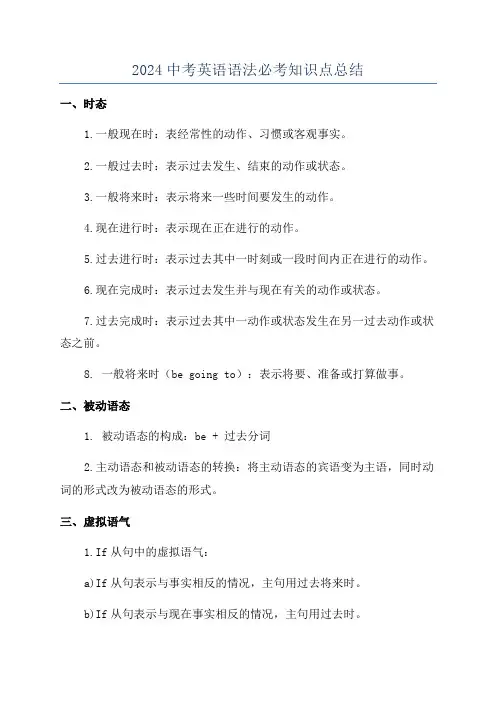
2024中考英语语法必考知识点总结一、时态1.一般现在时:表经常性的动作、习惯或客观事实。
2.一般过去时:表示过去发生、结束的动作或状态。
3.一般将来时:表示将来一些时间要发生的动作。
4.现在进行时:表示现在正在进行的动作。
5.过去进行时:表示过去其中一时刻或一段时间内正在进行的动作。
6.现在完成时:表示过去发生并与现在有关的动作或状态。
7.过去完成时:表示过去其中一动作或状态发生在另一过去动作或状态之前。
8. 一般将来时(be going to):表示将要、准备或打算做事。
二、被动语态1. 被动语态的构成:be + 过去分词2.主动语态和被动语态的转换:将主动语态的宾语变为主语,同时动词的形式改为被动语态的形式。
三、虚拟语气1.If从句中的虚拟语气:a)If从句表示与事实相反的情况,主句用过去将来时。
b)If从句表示与现在事实相反的情况,主句用过去时。
c) If从句表示与过去事实相反的情况,主句要用“had + 过去分词”。
2.虚拟条件句的其他情况:a) 与现在相反:as if, though, even if等引导的条件句,主句用过去时。
b)与将来相反:引导条件状语从句的主将从现,主句用过去时。
c)与过去相反:引导条件状语从句的主将从现,主句用过去完成时。
四、宾语从句1.宾语从句:在句子中作宾语的从句。
2.宾语从句的时态:按照实际情况使用时态。
3. 宾语从句的连接词:that, whether, if等。
五、定语从句1. 定语从句的构成:关系词(who, whom, whose, which, that)+句子。
2. 指物的定语从句:关系代词用which或that,在从句中充当主语、宾语或定语。
3. 指人的定语从句:关系代词用who或that,在从句中充当主语或宾语;关系代词用whom或that,在从句中充当宾语。
4. 定语从句的连接词从句中的位置:连接词(who, whom, which, that, whose)在从句中充当成分的位置。

中考英语常考的50个语法知识点1. 一般现在时:表示现在的普遍状况或习惯性动作,如:He often goes to school by bike.2. 一般过去时:表示过去发生的动作或存在的状态,如:He went to school by bus yesterday.3. 一般将来时:表示将来发生的动作或存在的状态,如:He will go to school by car tomorrow.4. 现在完成时:表示从过去其中一时间延续到现在为止的动作或状态,如:He has gone to school by train for three years.5. 现在进行时:表示正在进行的动作,如:He is going to school by subway now.6. 过去将来时:表示过去将来发生的动作或存在的状态,如:He was going to go to school by bus the next day.7. 一般疑问句:用一般疑问句来询问,如:Do you go to school by bike?8. 特殊疑问句:用特殊疑问句来询问,如:What did he go to school by yesterday?9. 肯定句:用肯定句表达事实,如:He goes to school by car.10. 否定句:用否定句表达事实,如:He doesn't go to school by bike.11. 祈使句:用祈使句表达请求或命令,如:Go to school by subway.12. 动词的一般式:表示一般的动作或状态,如:He goes to school by bus.13. 动词的原形:表示基本的动作,如:He go to school by train.14. 动词的现在分词:表示正在进行的动作,如:He is going to school by bike.15. 动词的过去分词:表示过去发生的动作,如:He went to school by car.16. 动词的第三人称单数形式:表示人的动作或状态,如:He goes to school by bike.17. 不定式:表示未完成的动作,如:He wanted to go to school by bus.18. 名词的复数形式:表示多个名词,如:Those buses are going to school.。
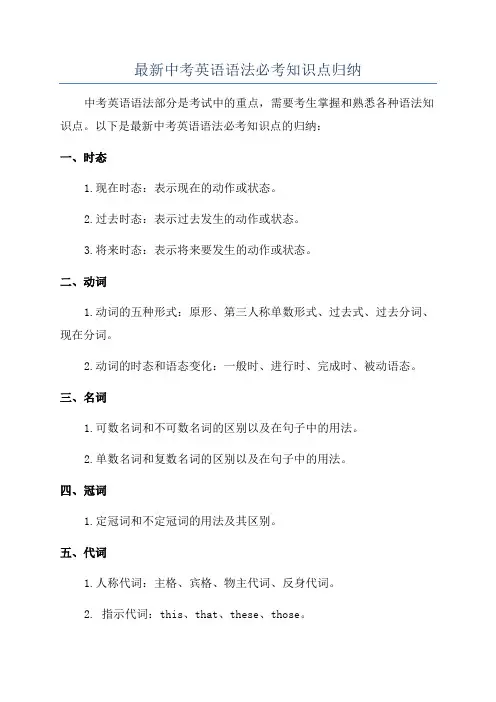
最新中考英语语法必考知识点归纳中考英语语法部分是考试中的重点,需要考生掌握和熟悉各种语法知识点。
以下是最新中考英语语法必考知识点的归纳:一、时态1.现在时态:表示现在的动作或状态。
2.过去时态:表示过去发生的动作或状态。
3.将来时态:表示将来要发生的动作或状态。
二、动词1.动词的五种形式:原形、第三人称单数形式、过去式、过去分词、现在分词。
2.动词的时态和语态变化:一般时、进行时、完成时、被动语态。
三、名词1.可数名词和不可数名词的区别以及在句子中的用法。
2.单数名词和复数名词的区别以及在句子中的用法。
四、冠词1.定冠词和不定冠词的用法及其区别。
五、代词1.人称代词:主格、宾格、物主代词、反身代词。
2. 指示代词:this、that、these、those。
3. 不定代词:some、any、no、every、each等。
六、形容词和副词1.形容词的用法及其在句子中的位置。
2.形容词的比较级和最高级的构成及用法。
3.副词的用法及其在句子中的位置。
七、介词1.常见的介词及其用法。
2.介词短语在句子中的作用。
八、连词1.并列连词及其连接的句子。
2.从属连词及其连接的句子。
九、虚拟语气1.虚拟语气的用法及其在条件句中的表示。
十、直接引语和间接引语1.直接引语和间接引语的区别及其在句子中的用法。
十一、固定搭配和常见短语1.固定搭配和常见短语的用法及其在句子中的位置。
以上是最新中考英语语法必考知识点的归纳,考生需要通过学习和积累这些知识点,提升自己的语法水平,从而在考试中取得好成绩。
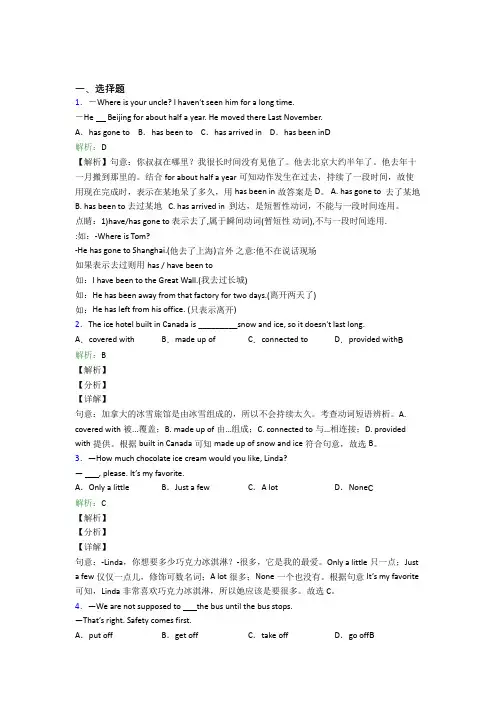
一、选择题1.-Where is your uncle? I haven't seen him for a long time.-He Beijing for about half a year. He moved there Last November.A.has gone to B.has been to C.has arrived in D.has been in D解析:D【解析】句意:你叔叔在哪里?我很长时间没有见他了。
他去北京大约半年了。
他去年十一月搬到那里的。
结合for about half a year可知动作发生在过去,持续了一段时间,故使用现在完成时,表示在某地呆了多久,用has been in故答案是D。
A. has gone to 去了某地B. has been to 去过某地 C. has arrived in 到达,是短暂性动词,不能与一段时间连用。
点睛:1)have/has gone to 表示去了,属于瞬间动词(暂短性动词),不与一段时间连用.:如:-Where is Tom?-He has gone to Shanghai.(他去了上海)言外之意:他不在说话现场如果表示去过则用has / have been to如:I have been to the Great Wall.(我去过长城)如:He has been away from that factory for two days.(离开两天了)如:He has left from his office. (只表示离开)2.The ice hotel built in Canada is _________snow and ice, so it doesn't last long. A.covered with B.made up of C.connected to D.provided with B解析:B【解析】【分析】【详解】句意:加拿大的冰雪旅馆是由冰雪组成的,所以不会持续太久。
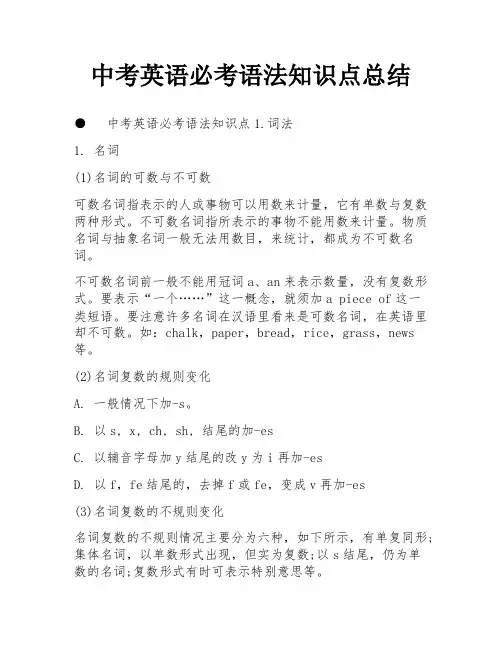
中考英语必考语法知识点总结●中考英语必考语法知识点1.词法1. 名词(1)名词的可数与不可数可数名词指表示的人或事物可以用数来计量,它有单数与复数两种形式。
不可数名词指所表示的事物不能用数来计量。
物质名词与抽象名词一般无法用数目,来统计,都成为不可数名词。
不可数名词前一般不能用冠词a、an来表示数量,没有复数形式。
要表示“一个……”这一概念,就须加a piece of这一类短语。
要注意许多名词在汉语里看来是可数名词,在英语里却不可数。
如:chalk,paper,bread,rice,grass,news 等。
(2)名词复数的规则变化A. 一般情况下加-s。
B. 以s, x, ch, sh, 结尾的加-esC. 以辅音字母加y结尾的改y为i再加-esD. 以f,fe结尾的,去掉f或fe,变成v再加-es(3)名词复数的不规则变化名词复数的不规则情况主要分为六种,如下所示,有单复同形;集体名词,以单数形式出现,但实为复数;以s结尾,仍为单数的名词;复数形式有时可表示特别意思等。
A.child---childrenfoot---feettooth---teethmouse---miceman---menwoman---women注意:与 man 和 woman构成的合成词,其复数形式也是 -men 和-women。
如:an Englishman,two Englishmen. 但German不是合成词,故复数形式为Germans;Bowman是姓,其复数是the Bowmans。
B. 单复同形如:deer,sheep,fish,Chinese,Japaneseli,jin,yuan,two li,three mu,four jin但除人民币元、角、分外,美元、英镑、法郎等都有复数形式。
如:a dollar, two dollars; a meter, two metersC. 集体名词,以单数形式出现,但实为复数。
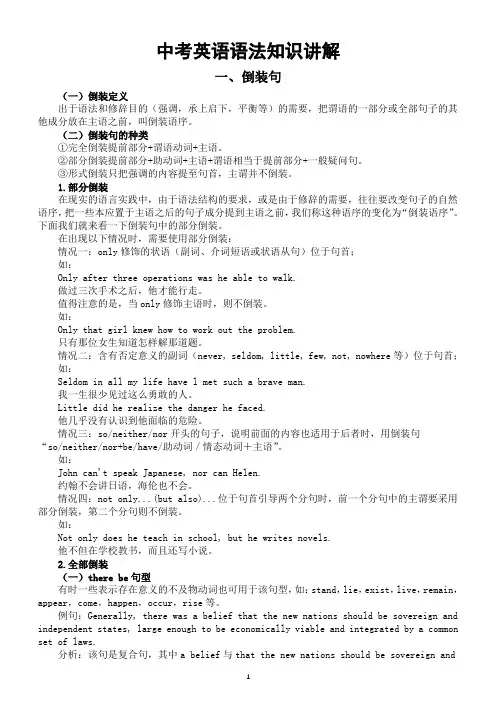
中考英语语法知识讲解一、倒装句(一)倒装定义出于语法和修辞目的(强调,承上启下,平衡等)的需要,把谓语的一部分或全部句子的其他成分放在主语之前,叫倒装语序。
(二)倒装句的种类①完全倒装提前部分+谓语动词+主语。
②部分倒装提前部分+助动词+主语+谓语相当于提前部分+一般疑问句。
③形式倒装只把强调的内容提至句首,主谓并不倒装。
1.部分倒装在现实的语言实践中,由于语法结构的要求,或是由于修辞的需要,往往要改变句子的自然语序,把一些本应置于主语之后的句子成分提到主语之前,我们称这种语序的变化为“倒装语序”。
下面我们就来看一下倒装句中的部分倒装。
在出现以下情况时,需要使用部分倒装:情况一:only修饰的状语(副词、介词短语或状语从句)位于句首;如:Only after three operations was he able to walk.做过三次手术之后,他才能行走。
值得注意的是,当only修饰主语时,则不倒装。
如:Only that girl knew how to work out the problem.只有那位女生知道怎样解那道题。
情况二:含有否定意义的副词(never, seldom, little, few, not, nowhere等)位于句首;如:Seldom in all my life have l met such a brave man.我一生很少见过这么勇敢的人。
Little did he realize the danger he faced.他几乎没有认识到他面临的危险。
情况三:so/neither/nor开头的句子,说明前面的内容也适用于后者时,用倒装句“so/neither/nor+be/have/助动词/情态动词+主语”。
如:John can't speak Japanese, nor can Helen.约翰不会讲日语,海伦也不会。
情况四:not only...(but also)...位于句首引导两个分句时,前一个分句中的主谓要采用部分倒装,第二个分句则不倒装。
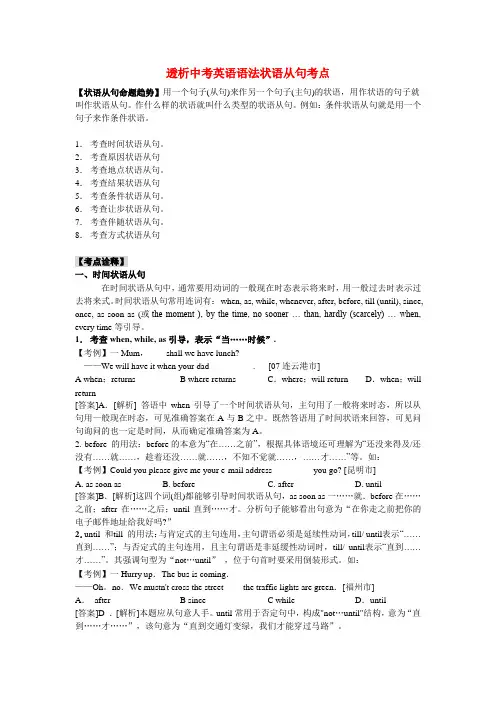
透析中考英语语法状语从句考点【状语从句命题趋势】用一个句子(从句)来作另一个句子(主句)的状语,用作状语的句子就叫作状语从句。
作什么样的状语就叫什么类型的状语从句。
例如:条件状语从句就是用一个句子来作条件状语。
1.考查时间状语从句。
2.考查原因状语从句3.考查地点状语从句。
4.考查结果状语从句5.考查条件状语从句。
6.考查让步状语从句。
7.考查伴随状语从句。
8.考查方式状语从句【考点诠释】一、时间状语从句在时间状语从句中,通常要用动词的一般现在时态表示将来时,用一般过去时表示过去将来式。
时间状语从句常用连词有:when, as, while, whenever, after, before, till (until), since, once, as soon as (或the moment ), by the time, no sooner … than, hardly (scarcely) … when, every time等引导。
1.考查when, while, as引导,表示“当……时候”.【考例】一Mum,____shall we have lunch?——We will have it when your dad__________. [07连云港市]A when;returnsB where returns C.where;will return D.when;will return[答案]A.[解析] 答语中when引导了一个时间状语从句,主句用了一般将来时态,所以从句用一般现在时态,可见准确答案在A与B之中。
既然答语用了时间状语来回答,可见问句询问的也一定是时间,从而确定准确答案为A。
2. before 的用法:before的本意为“在……之前”,根据具体语境还可理解为“还没来得及/还没有……就……,趁着还没……就……,不知不觉就……,……才……”等。
如:【考例】Could you please give me your e-mail address _________you go? [昆明市]A. as soon asB. beforeC. afterD. until[答案]B.[解析]这四个词(组)都能够引导时间状语从句,as soon as一……就.before在……之前;after在……之后;until直到……才。
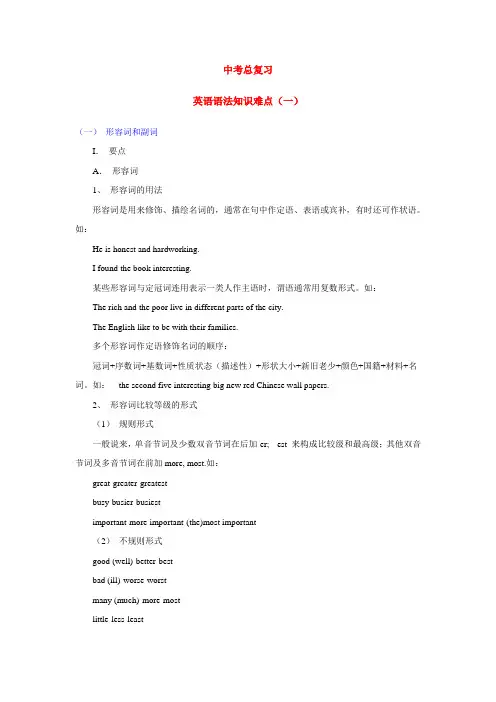
中考总复习英语语法知识难点(一)(一)形容词和副词I.要点A.形容词1、形容词的用法形容词是用来修饰、描绘名词的,通常在句中作定语、表语或宾补,有时还可作状语。
如:He is honest and hardworking.I found the book interesting.某些形容词与定冠词连用表示一类人作主语时,谓语通常用复数形式。
如:The rich and the poor live in different parts of the city.The English like to be with their families.多个形容词作定语修饰名词的顺序:冠词+序数词+基数词+性质状态(描述性)+形状大小+新旧老少+颜色+国籍+材料+名词。
如:the second five interesting big new red Chinese wall papers.2、形容词比较等级的形式(1)规则形式一般说来,单音节词及少数双音节词在后加-er; --est 来构成比较级和最高级;其他双音节词及多音节词在前加more, most.如:great-greater-greatestbusy-busier-busiestimportant-more important-(the)most important(2)不规则形式good (well)-better-bestbad (ill)-worse-worstmany (much)-more-mostlittle-less-least(3)形容词比较等级的用法①表示两者的比较,用形容词的比较级+than. 如:He is cleverer than the other boys.This one is more beautiful than that one.②表示两者以上的比较,用"the +形容词最高级(+名词)+of(in) …"如:He is the cleverest boy in his class.③表示两者是同等程度,用"as +形容词原级+as". 如:He is as tall as I.I have as many books as you.④越… 越…例如:The more I learn, the happier I am.⑤You can never be too careful. 越小心越好又如:You can never praise the teacher too highly.你怎么赞扬这个老师也不过分。
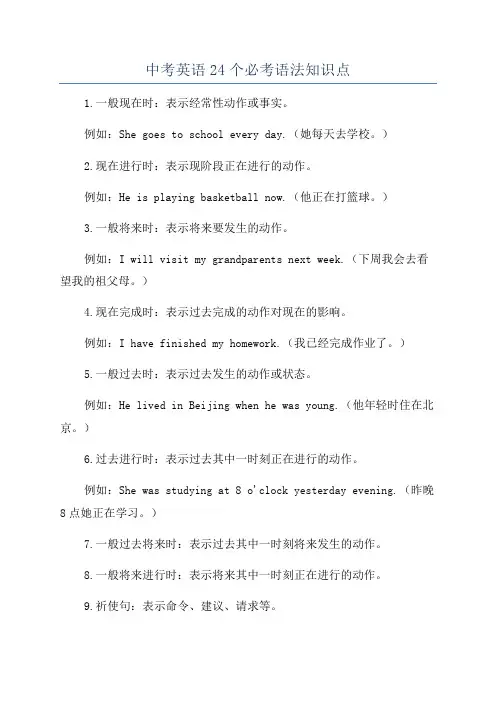
中考英语24个必考语法知识点1.一般现在时:表示经常性动作或事实。
例如:She goes to school every day.(她每天去学校。
)2.现在进行时:表示现阶段正在进行的动作。
例如:He is playing basketball now.(他正在打篮球。
)3.一般将来时:表示将来要发生的动作。
例如:I will visit my grandparents next week.(下周我会去看望我的祖父母。
)4.现在完成时:表示过去完成的动作对现在的影响。
例如:I have finished my homework.(我已经完成作业了。
)5.一般过去时:表示过去发生的动作或状态。
例如:He lived in Beijing when he was young.(他年轻时住在北京。
)6.过去进行时:表示过去其中一时刻正在进行的动作。
例如:She was studying at 8 o'clock yesterday evening.(昨晚8点她正在学习。
)7.一般过去将来时:表示过去其中一时刻将来发生的动作。
8.一般将来进行时:表示将来其中一时刻正在进行的动作。
9.祈使句:表示命令、建议、请求等。
例如:Close the door, please.(请关上门。
)10. 情态动词can表示能力和许可。
例如:She can swim fast.(她游泳很快。
)11. 情态动词may表示可能性和许可。
12. 情态动词must表示必须和推测。
例如:You must finish your homework before watching TV.(你必须先完成作业再看电视。
)13. 情态动词should表示应该和建议。
例如:We should protect the environment.(我们应该保护环境。
)14. 情态动词could表示过去的能力和请求。
例如:When I was young, I could run very fast.(我年轻时跑得很快。
中考英语语法知识点全解读中考对于每一位初中生来说都是一次重要的挑战,而英语作为其中的主要科目之一,语法知识的掌握至关重要。
在这篇文章中,我们将对中考英语的语法知识点进行全面解读,帮助同学们更好地应对中考。
一、名词名词是表示人、事物、地点或抽象概念的名称的词。
在中考中,名词的考点主要包括名词的数、名词所有格等。
1、名词的数可数名词:有单数和复数之分。
一般来说,直接在名词后加“s”构成复数,如“books”“apples”。
但也有一些特殊的变化规则,比如以“s”“x”“ch”“sh”结尾的名词,加“es”,如“boxes”“watches”;以“y”结尾的名词,“y”前是辅音字母的,要把“y”变为“i”,再加“es”,如“city cities”;“y”前是元音字母的,直接加“s”,如“toy toys”。
还有一些不规则的名词复数形式,如“man men”“woman women”“child children”“footfeet”“tooth teeth”等。
不可数名词:没有复数形式,常见的不可数名词有“water”“milk”“bread”“advice”“information”等。
2、名词所有格表示有生命的名词的所有格,一般在名词后加“’s”,如“Tom’s book”“my mother’s bag”。
如果名词是复数,以“s”结尾的,直接加“’”,如“students’ desks”;不以“s”结尾的,加“’s”,如“women’s room”。
表示无生命的名词的所有格,一般用“of +名词”的结构,如“the door of the room”“the cover of the book”。
二、冠词冠词分为不定冠词(a,an)和定冠词(the)。
1、不定冠词“a”用于辅音音素开头的单词前,“an”用于元音音素开头的单词前。
例如,“a book”“an apple”。
不定冠词表示泛指,指某一类人或事物中的一个。
【中考英语语法汇总】介词语法讲解(一)介词概述介词是一种虚词,在句子中不单独作任何句子成分。
它是一种表示名词和句中其他词之间关系的词。
它常和名词、动词、形容词等搭配,构成固定短语,表示不同意思。
介词还可以与名词构成介词短语,表示方位、方向、时间、地点、方式、原因等。
这些介词短语在句中可充当定语、状语、补语等。
2000—2005年的中考中主要考了形容词与介词的搭配:如:be famous for;表示时间的介词,如:at night;动词与介词的搭配,如:arrive in/have dinner with sb.;表示方式、手段的介词,如:by phone/in English.(二)基础知识梳理1.名词与介词的搭配a bit of有一点儿 a couple of两个、几个a kind of一种、一类 cover an area of占地面积have pity on sb.怜悯某人huge amounts of大量的make friends with与……交朋友 make fun of拿……开玩笑meet the needs of迎合……的需要 one after another一个接一个;连续地play a trick on捉弄 the week after next下下周2.动词与介词的搭配agree with sb.同意某人的意见 apologize to sb. for sth.为某事向某人道歉arrive at/in a place到达某地 ask for请求、寻求be covered with被……所覆盖 be made of由……制成be made up of由……组成 belong to属于break into破门而人、闯入 call on拜访care for照顾、喜欢 carry out执行check in办理登机 come across被理解;遇见come from出生于、来自 come on跟我来、走吧communicate with与……交cut down砍倒deal with= do with处理depend on= rely on依靠、依赖die of因……病而死dream of梦见dress up穿着、打扮 eat up= finish off吃光、喝完、吞噬enter for报名参加fall off从……跌落fill in填充、填写 find out找出、查明、了解get along/on with进展、与……相处 get in the way挡道get in进入、收集 get on上车get off下车 get rid of摆脱get ready for为….作准备 get to到达get tired of对……感到厌倦 go in for参加、从事于、酷爱,'^ go ahead先走、向前走;去吧 go for a swim去游泳go on a diet实行节食 go over复习go on with继续做某事 grow up长大、成长hand in上交 hear from收到……的来信hear of听说 help sb. with sth.帮助某人做某事hold on等等(别挂电话)hold up举起hurry off匆忙离开join.n参加、加入keep... from使……不做 keep in touch with与……保持联系keep off阻挡;不让接近 knock over撞倒、撞翻later on过来;后来 laugh at嘲笑learn.., from向……学习 leave for动身去let out放出 line up整队;排成行live on靠……为生look after照顾;照料look at看;观看 look for寻找look forward to期待着 look like看上去像;显得look out of从……朝外看look up查寻;抬头看make out辨认出make up one's mind下决心meet with遭遇 operate on sb.为……动手术pay for付……钱 pick out拾起play with玩弄point at指向;指着point out指出praise sb. for sth.为某事表扬某人prefer... to(比起……来)更喜欢 prepare for准备protect... from保护……免受 pull down推倒put off延期put on穿;戴上;上演put out伸出 put up举起;挂起run after追捕;追踪 run away逃跑search for搜寻;搜查see off为……送行sell out售完 set out/off for出发去……;起程去……set up建立;设立. shake hands with与……握手share with与……分享show off炫耀show sb around带某人参观 shut up住口speed up加快速度stop...from阻止……做take away拿走 take care of照料take charge of负责;管理;take hold of抓住take in吸入 take off脱掉(衣物等);起飞take out取出take part in参加take up开始从事 talk about谈到talk to/with与...谈话 tell... from区别;分辨think of想起;想到 think over仔细考虑throw away扔掉 tie up捆绑try on 试穿turn down(把音量)调低turn into变成 turn off关掉(电灯、电视、收音机等)turn on开,旋开(电灯、电视、收音机等) turn over翻车;翻阅;翻身turn out结果是;证明是 wake up醒来;叫醒wait for等待;等候 write down写下work out算出;制定出经典例题:1.The foreigners arrived __________Shanghai __________ night.A. at…atB. in…atC. in... inD. at... in2. Wushu is becoming more and more popular __________ westerners.A. amongB. betweenC. inD.within3. __________ the help of the teachers, we decorated. Ourclassroom__________lanterns, flowers and pictures yesterday.A. Under... withoutB. Under... amongC. With... withD.With...between4. The cakes __________ the shape of a round moon is called mooncakes.A. likeB. look likeC. asD. likes5.改错:The manager told his secretary that he would be back __________ three-thirty.A. inB. afterC. beforeD. at6. It was clever __________ the boy to work __________ the mathsproblems in less than ten minutes.A. for…outB. of... outC. for...onD. of... on7. My aunt Jane tried her best to reduce her weight ________ 6kg.A.about B.at C.to D.by8. In my opinion, I agree __________ you __________that.A. to… withB. with…toC. with.., withD. with.., on9. I am familiar__________ this school since I have worked here for morethan fifteen years.A. withB. toC. aboutD. of10. Would you please look __________ my baby girl __________ myabsence?A. after…duringB. for…duringC. after… inD. to...in11. Mexico is ________ the south of America.A. inB. toC. onD. of12. The boy ____ the bike is Jackie Hu from Britain.A. byB. onC. inD. with13. Smoking and drinking are not good _______ your health.A. forB. toC. ofD. at14. Can you see the cat hiding __________ the tree?A. onB. underC. overD. in15. The litter bin__________ the corner of the room is a present from mybrother.A. atB. onC. inD. among16. It's fun to see a large number of stars shining in the sky ________ aclear night.A. atB. inC. onD. of1. 【解析】答案是B。
中考英语语法难点知识点解析中考英语对于学生来说是一项重要的考试,而语法部分更是其中的关键。
掌握好语法知识不仅有助于提高答题的准确性,还能提升英语的综合运用能力。
下面我们就来详细解析一下中考英语中的一些语法难点知识点。
一、时态时态是中考英语语法中的重点和难点。
常见的时态包括一般现在时、一般过去时、一般将来时、现在进行时、过去进行时、现在完成时和过去完成时等。
一般现在时表示经常发生的动作或存在的状态,主语是第三人称单数时,动词要发生相应的变化。
例如:“He often plays football after school” 一般过去时则用于描述过去发生的动作或存在的状态,动词通常变为过去式。
如:“I went to Beijing last year” 一般将来时表示将来要发生的动作,常见的结构有“will +动词原形”和“be going to +动词原形”。
比如:“We will have a party tomorrow”现在进行时表示正在进行的动作,结构是“be +动词的现在分词”。
“She is reading a book now” 过去进行时强调过去某个时刻正在进行的动作,“I was doing my homework at eight o'clock yesterday evening” 现在完成时表示过去发生的动作对现在造成的影响或结果,或者过去开始的动作一直持续到现在,其结构是“have/has +过去分词”。
例如:“I havefinished my homework” 过去完成时则表示过去某个时间之前已经完成的动作,结构是“had +过去分词”。
二、语态语态分为主动语态和被动语态。
主动语态表示主语是动作的执行者,而被动语态表示主语是动作的承受者。
被动语态的构成是“be +过去分词”。
例如:“The book is written by him” 中考中对于被动语态的考查通常涉及到各种时态的被动语态形式以及不同语态的转换。
中考英语24个必考语法知识点中考是一个非常重要的考试,在中考中有许多重要的英语语法知识点,需要考生准备好。
下面将介绍中考英语中必考的24个语法知识点,供考生参考。
1、冠词:用于单数可数名词前,分为不定冠词(a,an)和定冠词(the),an表示单数可数名词的音音素开头,a表示单数可数名词除音音素开头外所有其他情况,the表示特定范围。
2、代词:代替句子中某些名词,可以称为代词,如I,you,he,she,it,we,they,his,her,their,ours,yours,that,this,these,those。
3、名词:名词是动词的补语,可以表示一个人,一件事物,一个地方,一种情况等,可以用一个单词表达,如car,chair,school,problem等。
4、形容词:用来修饰名词,表示名词的特征、性质、状态和质量等,如nice,beautiful,good,bad,big,small,well。
5、副词:修饰动词,表示动作的时间、地点、程度、方式等,如now,yesterday,soon,gently,quickly,very。
6、介词:表示一个短语和另一个短语之间的关系,一般放在句子中的前面,如in,on,at,by,for,with,of,against,between。
7、动词:表示动作或者状态的词,如run,walk,jump,eat,be,swim,work,study等。
8、连词:连接两个句子,一般用and,or,but,so,if,because,while等。
9、情态动词:表示说话者对说话内容的态度,如can,must,may,need,ought,shoould,would,will,could等。
10、定语从句:用来修饰名词的从句,一般包括时间、地点、原因,如the book which I bought yesterday,the man who lives next door。
初中英语中考必考语法知识点作为英语学习的基础,语法的掌握对于学生的英语水平提高非常重要。
在中考中,语法类试题占据了相当大的比重,因此,对于初中英语中考必考的语法知识点的掌握需要格外重视。
一、动词时态和语态1.一般现在时:表示经常性、习惯性、客观真理等。
2.一般过去时:表示过去的动作或状态。
3.一般将来时:表示未来发生的动作或状态。
4.进行时态:表示正在进行或进行中的动作。
5.完成时态:表示已完成的动作。
6.被动语态:表示句子的动作是由被动的主语所承受的。
二、名词和代词1.名词的分类:可数名词和不可数名词。
2.代词的分类:人称代词、物主代词、指示代词、疑问代词、不定代词。
3.名词所有格的表示方式:名词加’s,名词以s结尾加’,不规则名词所有格。
4.反身代词:表示动作的执行者和接受者是同一个人或物。
三、冠词和形容词1.冠词:不定冠词和定冠词。
2.形容词的位置:用在名词前作定语,后置形容词时与名词之间有连词或介词。
3. 形容词的比较级和最高级:单音节词比较级加er,最高级加est;双音节或多音节词比较级加more,最高级加most。
四、副词和介词1.副词的分类:修饰动词、形容词和副词等,表示时间、地点、程度、方式和频率等。
2.介词的用法:表示时间、地点、方向、方式和原因等。
五、连词和语气1.连词:并列连词、从属连词、转折连词。
2.虚拟语气:表示与事实相反或未实现的情况。
3.祈使句:表示命令、请求、建议等。
六、陈述句、疑问句、感叹句和复合句1.陈述句:陈述事实、描述情况和说出观点等。
2.疑问句:询问事实、情况和观点等。
3.感叹句:表示赞美、惊奇、慨叹和惋惜等。
4.复合句:由主句和从句构成,其中从句分为定语从句、状语从句和宾语从句等。
以上就是初中英语中考必考的语法知识点,认真掌握对于学生的英语学习和考试都有很大帮助。
中考英语语法知识点总结归纳一、名词。
1. 名词的数。
- 可数名词:有单复数形式。
- 规则变化:- 一般在词尾加 -s,如book - books。
- 以s, x, ch, sh结尾的名词加 -es,如box - boxes,watch - watches。
- 以辅音字母 + y结尾的名词,变y为i再加 -es,如baby - babies;但以元音字母 + y结尾的名词直接加 -s,如day - days。
- 以f或fe结尾的名词,变f或fe为v再加 -es,如knife - knives,leaf - leaves(但也有一些直接加 -s的,如roof - roofs)。
- 不规则变化:- 单复数同形,如fish(表示鱼的种类时可加 -es),sheep,deer等。
- 改变元音字母,如man - men,woman - women,foot - feet,tooth - teeth 等。
- 表示“某国人”的复数:- 中日不变,如Chinese - Chinese,Japanese - Japanese。
- 英法变,如Englishman - Englishmen,Frenchman - Frenchmen。
- 其他加 -s,如American - Americans。
- 不可数名词:没有复数形式,不能直接用数词修饰,如water,milk,bread 等。
如果要表示数量,可以用“a piece of/a glass of/a cup of +不可数名词”等结构。
2. 名词所有格。
- 有生命的名词所有格:- 一般在名词后加's,如Tom's book。
- 以s结尾的复数名词只加',如the students' classroom。
- 表示两者或多者共有时,只在最后一个名词后加's,如Lucy and Lily's room (表示两人共有的房间);表示各自拥有时,每个名词后都加's,如Lucy's and Lily's rooms(表示两人各自的房间)。
中考英语语法知识点解析一、词类、句子成分和构词法:1、词类:英语词类分十种:名词、形容词、代词、数词、冠词、动词、副词、介词、连词、感叹词。
1、名词(n.):表示人、事物、地点或抽象概念的名称。
如:boy, morning, bag,ball, class, orange.2、代词(pron.):主要用来代替名词。
如:who, she, you, it .3、形容词(adj..):表示人或事物的性质或特征。
如:good, right, white, orange .4、数词(num.):表示数目或事物的顺序。
如:one, two, three, first, second,third, fourth.5、动词(v.):表示动作或状态。
如:am, is,are,have,see .6、副词(adv.):修饰动词、形容词或其他副词,说明时间、地点、程度等。
如:now,very, here, often, quietly, slowly.7、冠词(art..):用在名词前,帮助说明名词。
如:a, an, the.8、介词(prep.):表示它后面的名词或代词与其他句子成分的关系。
如in, on, from,above, behind.9、连词(conj.):用来连接词、短语或句子。
如and, but, before .10、感叹词(interj..)表示喜、怒、哀、乐等感情。
如:oh, well, hi, hello.2、句子成分:英语句子成分分为七种:主语、谓语、宾语、定语、状语、表语、宾语补足语。
1、主语是句子所要说的人或事物,回答是―谁‖或者―什么‖。
通常用名词或代词担任。
如:I‘m Miss Green.(我是格林小姐)2、谓语动词说明主语的动作或状态,回答―做(什么)‖。
主要由动词担任。
如:Jack cleans the room every day. (杰克每天打扫房间)3、表语在系动词之后,说明主语的身份或特征,回答是―什么‖或者―怎么样‖。
通常由名词、代词或形容词担任。
如:My name is Ping ping .(我的名字叫萍萍)4、宾语表示及物动词的对象或结果,回答做的是―什么‖。
通常由名词或代词担任。
如:He can spell the word.(他能拼这个词)有些及物动词带有两个宾语,一个指物,一个指人。
指物的叫直接宾语,指人的叫间接宾语。
间接宾语一般放在直接宾语的前面。
如:He wrote me a letter . (他给我写了一封信)有时可把介词to或for加在间接宾语前构成短语,放在直接宾语后面,来强调间接宾语。
如:He wrote a letter to me . (他给我写了一封信)5、定语修饰名词或代词,通常由形容词、代词、数词等担任。
如:Shanghai is a big city .(上海是个大城市)6、状语用来修饰动词、形容词、副词,通常由副词担任。
如:He works hard .(他工作努力)7、宾语补足语用来说明宾语怎么样或干什么,通常由形容词或动词充当。
如:They usually keep their classroom clean.(他们通常让教室保持清洁) / He often helps me do my lessons.(他常常帮我做功课) / The teacher wanted me to learn French all by myself.(老师要我自学法语)☆同位语通常紧跟在名词、代词后面,进一步说明它的情况。
如:Where is your classmate Tom ?(你的同学汤姆在哪里?)不可数名词一般没有复数形式,说明其数量时,要用有关计量名词。
如:a bag of rice→two bags of rice, a piece of paper→three pieces of paper, a bottle of milk→five bottles of milk.二、名词:1、英语名词可分专有名词和普通名词两大类:1、专有名词是个别的人、地、物、团体、机构等的专用名称。
专有名词中实词的第一个字母要大写。
如:Beijing, Tom, the People‘s Republic of China(中华人民共和国)专有名词如果是含有普通名词的短语,则必须使用定冠词the。
如:the Great Wall(长城)姓氏名如果采用复数形式,则表示该姓氏一家人(复数含义),如:the Greens(格林一家人)。
2、普通名词是许多人或事物的共有名称。
如:pupil, family, man, foot.普通名词又分为可数名词和不可数名词。
▲可数名词是可以用简单的数词进行计数的名词,如: box, child, orange;▲不可数名词是不可以用简单的数词进行计数的名词。
如:water, news, oil,population, information .2、英语可数名词的单复数:英语可数名词有单数和复数两种形式。
1、名词由单数变复数的基本方法如下:①在单数名词词尾加s。
如:map →maps,boy→boys,horse→horses, table→tables.②s,o,x ,sh,ch结尾的词加es.如:class→classes, box→boxes, hero→heroes,dish→dishes, bench→benches.[注]:少数以o结尾的词,变复数时只加s。
如:photo→photos, piano→pianos.③以辅音字母加y结尾的名词,变y为i,再加es。
如:family→families, city→cities,party→parties.④以f或fe结尾的名词,变f或fe为v,再加es。
如:shelf→shelves, wolf→wolves,life→lives, knife→knives.2、不规则变化:man→men, woman→women, sheep→sheep,tooth→teeth, fish→fish,child→children, ox→oxen, goose→geese不可数名词一般没有复数形式,说明其数量时,要用有关计量名词。
如:a bag of rice→two bags of rice, a piece of paper→three pieces of paper, a bottle of milk→five bottles of milk.3、名词所有格:1、名词所有格表示所属关系,相当于物主代词,在句中作定语、宾语或主语。
其构成法如下:(1)表示人或其它有生命的东西的名词常在词尾加‘s。
如:Childern‘s Day(儿童节),my sister‘s book(我姐姐的书)(2)以s或es结尾的复数名词。
只在词尾加‘。
如:Teachers‘ Day(教师节)(3)有些表示时间、距离以及世界、国家、城镇等无生命的名词,也可在词尾加‘s. 如:today‘s newspaper(今天的报纸), ten minutes‘ break(十分钟的课间休息),China‘s population(中国的人口).(4)无论表示有生命还是无生命的东西的名词,一般均可用介词of短语来表示所有关系。
如:a fine daughter of the Party(党的好女儿).2、[注解]:①‗s还可以表示某人的家或者某个店铺,如:my aunt‘s(我阿姨家), the doctor‘s (诊所)②两人共有某物时,可以采用 A and B‘s 的形式,如:Lucy and Lily‘s bedroom(露西和丽丽合住的卧室)③―of+名词所有格/名词性物主代词‖,称为双重所有格,如:a friend of my father‘s (我父亲的一位朋友), a friend of mine(我的一位朋友)4、名词或代词作主语时和谓语之间的单复数的一致问题:1、谓语和谓语基本保持单复数的一致,即:主语是可数名词单数或不可数名词时,谓语动词用单数形式:如:The computer was a great invention.(计算机是个了不起的发明)The water in the glass is very cold.(玻璃杯里的水很冷)2、集体名词(如family, class, team, group, row, police, school等)做句子主语时,①如果表示整体概念,则谓语用单数形式,如:Class Three is a very good class.(三班是好班)②如果表示其中的所有成员时,则谓语用复数形式,如:Class Three have a map of China.(三班有张中国地图)3、Chinese, Japanese, fish, sheep, people等表示单个时谓语用单数,表示许多时,谓语用复数。
如:There is a sheep in the yard.(院子里有只绵羊) / There are some sheep in the yard.(院子里有一些绵羊)4、maths, news等虽然有s结尾,但不是复数,因此谓语仍用单数:The news is very exciting. (这个消息令人兴奋)5、glasses, shoes, socks, trousers, gloves等名词往往用复数形式,故谓语用复数。
如:The trousers are very cheap and I want to take them.(裤子很便宜,我想买)6、a lot of 后跟名词复数时谓语用复数形式,跟不可数名词时谓语用单数形式。
如:A lot of students are playing baseball now.(现在有许多学生在打垒球) A lot of timewas wasted on that work.(大量的时间花在了那个工作上)(被动句)7、and 连接两个名词做主语时,谓语原则上用复数,但是两个名词若构成一个整体事物时,谓语则用单数。
如:The teacher and his son are picking apples now.(老师和他的儿子在摘苹果) / Fish and chips is very famous food. (鱼和薯条是一种出名的食品)8、 there be 句型中be的单复数一般由靠近的名词决定。
如:There is a table and four chairs in the room.(房间里有一张桌子和四张椅子)9、用both…and…连接两个事物做主语时,谓语一般用复数。